

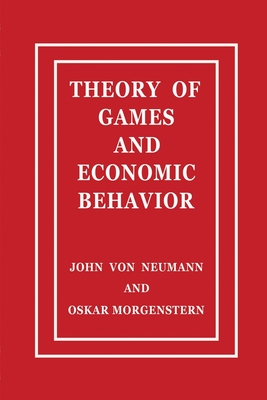
John von Neumann and Oskar Morgenstern conceived a groundbreaking mathematical theory of economic and social organization, based on a theory of games of strategy. Not only would this revolutionize economics, but the entirely new field of scientific inquiry it yielded--game theory--has since been widely used to analyze a host of real-world phenomena from arms races to optimal policy choices of presidential candidates, from vaccination policy to major league baseball salary negotiations.
And it is today established throughout both the social sciences and a wide range of other sciences.
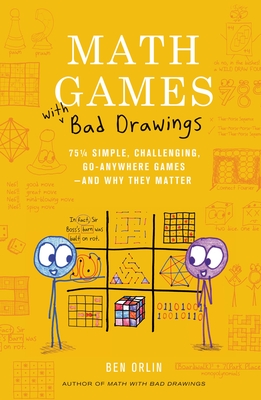
Bestselling author and worst-drawing artist Ben Orlin expands his oeuvre with this interactive collection of mathematical games. With 70-plus games, each taking a minute to learn and a lifetime to master, this treasure trove will delight, educate, and entertain.
From beloved math popularizer Ben Orlin comes a masterfully compiled collection of dozens of playable mathematical games.This ultimate game chest draws on mathematical curios, childhood classics, and soon-to-be classics, each hand-chosen to be (1) fun, (2) thought-provoking, and (3) easy to play. With just paper, pens, and the occasional handful of coins, you and a partner can enjoy hours of fun--and hours of challenge. Orlin's sly humor, expansive knowledge, and so-bad-they're-good drawings show us how simple rules summon our best thinking. Games include:

John von Neumann and Oskar Morgenstern conceived a groundbreaking mathematical theory of economic and social organization, based on a theory of games of strategy. Not only would this revolutionize economics, but the entirely new field of scientific inquiry it yielded--game theory--has since been widely used to analyze a host of real-world phenomena from arms races to optimal policy choices of presidential candidates, from vaccination policy to major league baseball salary negotiations.
And it is today established throughout both the social sciences and a wide range of other sciences.
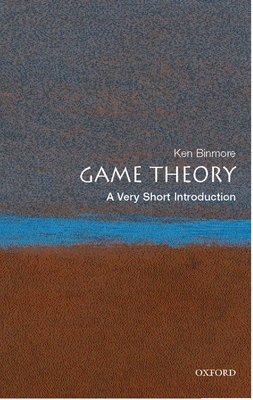

Computational Global Macro offers investors a new paradigm for the analysis of geopolitical risk. By drawing on game theory, machine learning, and causal inference, the book provides investors with a novel framework for analyzing the political and economic interactions between global actors. In doing so, it presents a counterpoint to the often informal and speculative approach to geopolitical analysis that is prevalent in the research produced by investment firms. The book will thus serve as a valuable reference for investment professionals, students, and academics seeking to apply sophisticated quantitative tools to the development of their macro views.

John von Neumann and Oskar Morgenstern conceived a groundbreaking mathematical theory of economic and social organization, based on a theory of games of strategy. Not only would this revolutionize economics, but the entirely new field of scientific inquiry it yielded--game theory--has since been widely used to analyze a host of real-world phenomena from arms races to optimal policy choices of presidential candidates, from vaccination policy to major league baseball salary negotiations.
And it is today established throughout both the social sciences and a wide range of other sciences.

Game Theory: A Simple Introduction offers an accessible and enjoyable guide to the basic principles and extensive applications of game theory.
Understand a game matrix, prisoners' dilemma, dominant and mixed strategies, zero-sum games, Pareto efficiency, the Nash equilibrium, and see the power of asymmetric information.
Calculate payoffs and find outcomes in games involving characters such as Jack and Jill, or friend and stranger. Look at the effects of altruism and hatred on games, and see how games can change over time.
Explore examples looking at gang members, free riders, global governance, a long-term relationship, competing corporations, advertisers and their customers, along with familiar hawk-dove and chicken games.
See game players use every trick in the book to get what they want, with over 50 images to guide through the steps they use to play the game.

The puzzles in this book include a wide variety of beautiful landscape, flower, animal and outdoor images. Our professional artists will leave you with breathtaking finished images that you can color, tear out and hang up if you like. You'll be blown away by the drawings and can try to figure each one out as they gradually appear in front of your eyes. There is an answer key at the end in case you get stuck!
Each image is printed on high-quality paper and every drawing is followed by a blank sheet of paper so you never have to worry about tearing individual images out of the book.
You will get:
Enjoy the puzzles and let your stress melt away!

Useful Game Theory offers a refreshing perspective on modern wisdom, empowering readers to master strategic decision-making with the tools they already possess.
Every decision you make involves an element of game theory, often without you even realizing it. In this insightful book, economist Jay Prag and marketing strategist Amanda Ishak Prag delve into the essence of human nature, transforming the mathematical principles of game theory into practical, everyday strategies. Through familiar proverbs and timeless wisdom, readers will explore how elements like reputation, biases, cooperation, and family dynamics influence our strategic interactions.
From navigating a four-way stop and choosing take-out dinners to understanding the complexities of nuclear disarmament, Useful Game Theory demonstrates how recognizing the structure of games-players, choices, and outcomes-can enhance decision-making in all aspects of life.

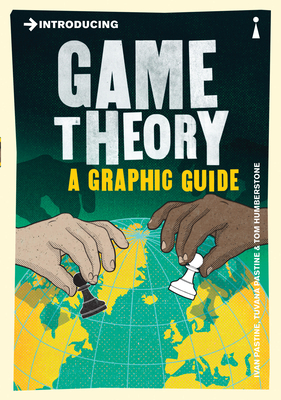
When should you adopt an aggressive business strategy? How do we make decisions when we don't have all the information? What makes international environmental cooperation possible?
Game theory is the study of how we make a decision when the outcome of our moves depends on the decisions of someone else. Economists Ivan and Tuvana Pastine explain why, in these situations, we sometimes cooperate, sometimes clash, and sometimes act in a way that seems completely random. Stylishly brought to life by award-winning cartoonist Tom Humberstone, Game Theory will help readers understand behaviour in everything from our social lives to business, global politics to evolutionary biology. It provides a thrilling new perspective on the world we live in.![God Of War Ragnarok Official Guide [Color]](https://otimages.com/Bookcover/9651/9798367009651.jpg)
THE BEST GUIDE!!! ★★★★★
God of War Ragnarok presents a fantastic conclusion to the Norse saga, pushing Kratos and Atreus to a level in storytelling matched by few. Every character is impeccably written, having me in stitches one minute and in tears the next. The Nine Realms are stunning to explore with an exceptional level of detail, an abundance of different enemy designs and significant side-missions that are frankly unavoidable. Sony Santa Monica has quite possibly delivered the greatest one-two punch in video game history.
We will walk you through the game, provide professional strategies and tips, as well as all the secrets in the game.
A big book of players' hacks organized in an easy-to-reference encyclopedia format, this book will show readers the ins and outs of the game. Become a Pro Player in God Of War Ragnarok.
Scroll to the top of the page and click add to cart to purchase instantly

A lucid and penetrating development of game theory that will appeal to the intuition . . . a most valuable contribution. -- Douglas R. Hofstadter, author of Gödel, Escher, Bach
The foundations of game theory were laid by John von Neumann, who in 1928 proved the basic minimax theorem, and with the 1944 publication of the Theory of Games and Economic Behavior, the field was established. Since then, game theory has become an enormously important discipline because of its novel mathematical properties and its many applications to social, economic, and political problems.
Game theory has been used to make investment decisions, pick jurors, commit tanks to battle, allocate business expenses equitably -- even to measure a senator's power, among many other uses. In this revised edition of his highly regarded work, Morton Davis begins with an overview of game theory, then discusses the two-person zero-sum game with equilibrium points; the general, two-person zero-sum game; utility theory; the two-person, non-zero-sum game; and the n-person game.
A number of problems are posed at the start of each chapter and readers are given a chance to solve them before moving on. (Unlike most mathematical problems, many problems in game theory are easily understood by the lay reader.) At the end of the chapter, where solutions are discussed, readers can compare their common sense solutions with those of the author. Brimming with applications to an enormous variety of everyday situations, this book offers readers a fascinating, accessible introduction to one of the most fruitful and interesting intellectual systems of our time.


The definitive introduction to game theory
This comprehensive textbook introduces readers to the principal ideas and applications of game theory, in a style that combines rigor with accessibility. Steven Tadelis begins with a concise description of rational decision making, and goes on to discuss strategic and extensive form games with complete information, Bayesian games, and extensive form games with imperfect information. He covers a host of topics, including multistage and repeated games, bargaining theory, auctions, rent-seeking games, mechanism design, signaling games, reputation building, and information transmission games. Unlike other books on game theory, this one begins with the idea of rationality and explores its implications for multiperson decision problems through concepts like dominated strategies and rationalizability. Only then does it present the subject of Nash equilibrium and its derivatives. Game Theory is the ideal textbook for advanced undergraduate and beginning graduate students. Throughout, concepts and methods are explained using real-world examples backed by precise analytic material. The book features many important applications to economics and political science, as well as numerous exercises that focus on how to formalize informal situations and then analyze them.

Brian Clegg was always fascinated by Isaac Asimov's classic Foundation series of books, in which the future is predicted using sophisticated mathematical modelling of human psychology and behaviour.
Only much later did he realise that Asimov's 'psychohistory' had a real-world equivalent: game theory. Originating in the study of probabilistic gambling games that depend on a random source - the throw of a dice or the toss of a coin - game theory soon came to be applied to human interactions: essentially, what was the best strategy to win, whatever you were doing? Its mathematical techniques have been applied, with varying degrees of wisdom, to fields such as economics, evolution, and questions such as how to win a nuclear war. Clegg delves into game theory's colourful history and significant findings, and shows what we can all learn from this oft-misunderstood field of study.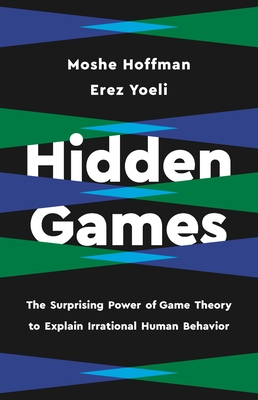
Two MIT economists show how game theory--the ultimate theory of rationality--explains irrational behavior
We like to think of ourselves as rational. This idea is the foundation for classical economic analysis of human behavior, including the awesome achievements of game theory. But as behavioral economics shows, most behavior doesn't seem rational at all--which, unfortunately, casts doubt on game theory's real-world credibility.
In Hidden Games, Moshe Hoffman and Erez Yoeli find a surprising middle ground between the hyperrationality of classical economics and the hyper-irrationality of behavioral economics. They call it hidden games. Reviving game theory, Hoffman and Yoeli use it to explain our most puzzling behavior, from the mechanics of Stockholm syndrome and internalized misogyny to why we help strangers and have a sense of fairness.
Fun and powerfully insightful, Hidden Games is an eye-opening argument for using game theory to explain all the irrational things we think, feel, and do.
